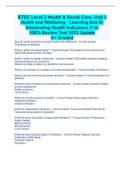Other
AC 1.1 and 1.2 unit 1 model answer
- Module
- Changing Awareness of Crime
- Institution
- WJEC
An in depth model answer for the unit one controlled assessment, covering both unit 1 ac 1.1 and 1.2. Case studies are included and there are bold words used to highlight details that have been included. All of the assessment criteria have been met and this can be used to set out a clear example of...
[Show more]








